|
Trigger Warnings: global warming, child sexual trafficking, famine, witch trials. 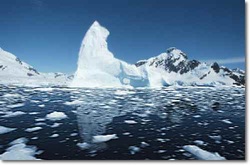 A few months ago the European Space Agency announced that satellite images show arctic ice disappearing at a rate 50% faster than predicted, which could mean that it will have vanished completely by 2022, nine years from now. Not only would that lose us the cooling air currents that stream across the northern hemisphere, but also that immense white reflector that has been sending the sun's rays back into space. As a survivor of extreme early abuse, I was programed for suicide, told to kill myself rather than reveal what was done to me. It's like a kind of toxic, elevator music background noise: you should kill yourself now, you should kill yourself now. I've never obeyed, and never will, but I hear it. One night, as I was drifting to sleep, that strangely calm and impersonal instruction drifted once again across my psyche and at the edge of sleep, my response was, No, I'm going to fight for my planet. 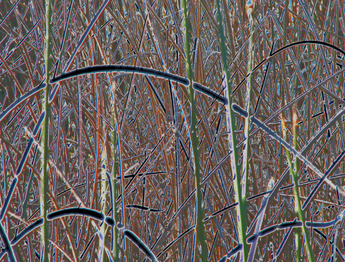 Tule grass, Northern California Tule grass, Northern California I have a million nightingales on the branches of my heart, singing freedom, freedom, freedom. My favorite a cappella singing group, Vocolot,sings these words by Linda Hirschhorn, and when I listen, I hear the million voices that are with me whenever I can open my inner ears. I have a million tiny threads that run from each molecule of my body, toward every living thing. They connect me to what we call "nature" as if it were some faraway place, something we can't belong to, but always long for, and visit on weekends, or in books. To me, the world is full of sentient beings, strange kin, equal and alien intelligences with which we share a universe. Birds speak, trees speak, fog speaks. I see land, not real estate. I see wild and magical elders, not pets or mascots. I do not believe we were given dominion. I do not believe we are the pinnacle of evolution. There is no pinnacle. 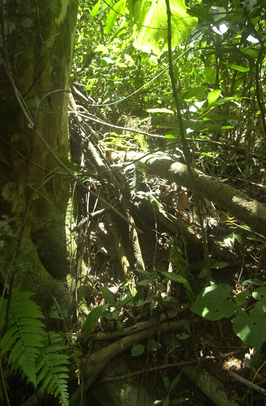 Our land in Maricao. Our land in Maricao. I was raised by a mountain drenched with tropical rain, slick with iron rich clay, wildly overgrown with a thousand shades of green, from tiny mosses and curled fronds of fern, crisp iridescent banks of alegria, and thick podded orchid leaves erupting in pale sprays of waxy petal, through shaggy tree ferns, elegantly pinstriped leaves of banana plants, and wiry coffee bushes hung with darkly elegant leaf and crusted with white, gardenia scented blossom, to the great, white palmed hand-leaves of yagrumo trees, the flame flowered tulipáns, and robles scattering drifting cascades of ruffled lavender blossoms. I was raised by lizards and frogs and serpentine rock, raised by the red tailed hawks we call guaraguao in the language of my ancestors, to whom trees were chieftains, honored with names and rituals before they were felled to make canoes. 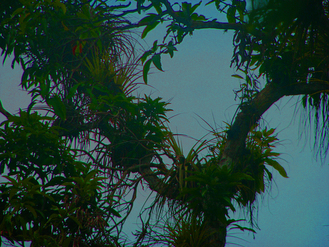 Bromeliads, Sierra del Rosario, Cuba Bromeliads, Sierra del Rosario, Cuba There are a million threads that bind me into the ecology of that land, and because of this, streams are people to me, rocks are beings, clouds full of light have voices. I am animal, mineral, vegetable, water and light, like everything else. I deny nothing. Because I was raised by a mountain and a distant view of sea, and by parents who saw and felt nature, because I was allowed to run wild on that mountain, I still have a million left, of the thousands of billions of possible ties that could knit us together into one infinitely complex organism, incapable of what is happening now. 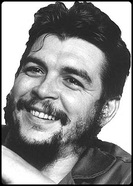 Che Che There are people who think that this is sentimentality, that nothing is alive but ourselves, and all the rest is ours to use; that this sparkling net of threads is a romantic illusion, and what is real is to make something of it, to turn it into service or coin. Over the course of time "reality" which once meant true has merged with royalty and realty--the right to possess. Be realistic, we are told. Meaning, surrender to the limits placed on love, imagination and hope by greed. Greed sees only itself as practical. Greed ridicules love--for the world, for humanity, for each other--as naive. But I was raised to think like Che Guevara, who said revolutionaries were driven by love. Who said seamos realista y hagamos lo imposible. Let's be realistic and do the impossible. 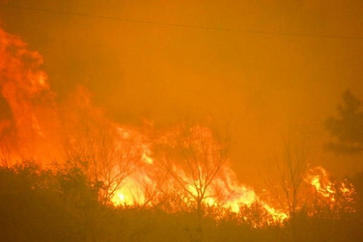 Colorado wildfires (US Forestry) Colorado wildfires (US Forestry) From my posts of last summer, about the sexual trafficking of children, to the imminent peril of the living world at the hands of the ruthless rich, including the suicidal avarice of the fossil fuel industry, might seem a leap; even more so my love song to the patch of land where I was grown, but they aren't. Greed devours the life of this world: children, orchids, oceans. Greed literally sets the planet on fire in order to keep piling wealth on top of unimaginable and unspendable wealth. Unspendable, because when the crops fail, the cities become uninhabitable, and the acid oceans rise to drown the coast lands and the islands, there will be no more exclusive, luxury beach resorts, no $20,000 a night suites in Paris or New York, no private jet excursions to Dubai, no multimillion dollar penthouses, no gourmet chefs preparing feasts. Greed has the delusion of immunity, of immortality, and imagines itself exempt from the fate it is crafting for the rest of us. You don't need me to tell you that the fossil fuel industry is the epitome of reckless greed. Bill McKibben recently laid out for us, in precise detail, just how close to the edge we are skating. That the oil, gas and coal that's already been claimed, tallied and prepared for combustion is many times more than what we can burn without destroying our own life support system. Unpalatable as it is to the momentum of life as usual, we need to do right now what will be forced on us very soon: stop all fossil fuel production immediately, go ahead and precipitate the collapse of dynasties and economies, and get busy with figuring out how we're going to feed, house, clothe and transport ourselves. None of this is really news, though many of us keep pretending otherwise. 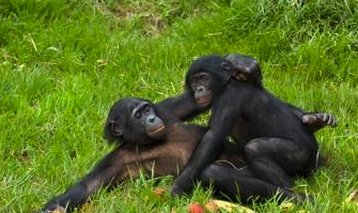 We know the consequences of greed are going to be terrible, but we have been deceived into believing we can let it slide, can bargain with it, can do a little remodeling of the profit driven economy and still live in this collapsing building, uncrushed. I have to confess that I don't really understand greed. I get its smaller manifestations--nabbing the last ripe strawberry, calling dibs on the better bedroom. But the kind of greed that blots out whole civilizations just to fill already overflowing coffers, and what's more, is willing to light the fuse under its own chair, just for the thrill of having way too much, for the short span of time before the spark hits the dynamite and blows everyone up--this has mystified me for years. I've thought about it a lot. I was raised by Marxists who read and thought and argued about history, ecology and human cultures, and I don't for a second buy the notion that greed, war and exploitation are human nature. That's just shorthand for "don't question this." For every war-is-hardwired photograph of a teeth-bared dominant male chimpanzee you can slap on the table, I'll raise you a bonobo making love not war, wild geese caring for their injured, and dolphins needlessly rescuing drowning humans, in spite of what we do to them. 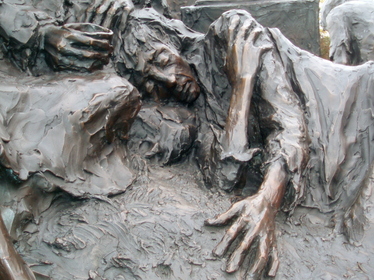 Famine memorial, Philadelphia Famine memorial, Philadelphia For a long time I thought of greed as a kind of spiritual eating disorder in which no amount of consumption is ever enough, nothing makes the soul feel full. I imagined a collective inherited trauma passed on from some great famine of the prehistoric world, that left certain people permanently ravenous for more, forever unsatisfied because the present gluttony can't fill the aching void of a past starvation. In Re-Evaluation Counseling (RC) which I have practiced for 28 years, we have the concept of a frozen need, the endlessly frustrating attempt to retroactively satisfy an unfilled need, to prevent what's already happened, to wring a redo out of people who weren't there the first time round. It's what leads so many of us to fall desperately in love with anyone who can miss the mark the way our parents did-- the wild hope that it's not too late to change the past. Fossilized emotion, fueling wanton acts. 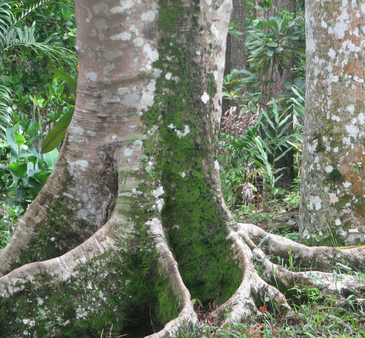 Elders, Sierra del Rosario, Cuba Elders, Sierra del Rosario, Cuba But lately I've been thinking about the million threads I still possess, about how they tether me to a moral code that is imposed on me by the breathing leaves and the crickets and the night sky--my sense of accountability to everything, not only because in my universe everything is alive and has the right to exist, but because I can feel our interdependence in my skin, my bowels, my throat and lungs and fingertips. I am not a vegetarian. I eat fish, I use wood and paper, I wear silk. I accept that things die to give me life, clothing, shelter. But I know that the things that die are part of me, that I owe them respect, and if I cut down a tree for its wood, it's a kind of amputation, so I pause, to honor the tree and myself, two parts of a web, to be aware of the act of cutting, to know its cost. 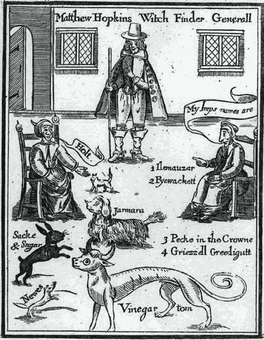 Witch hunter's manual, 1647. Witch hunter's manual, 1647. But what if all my strands were severed? What if I didn't feel any loss when other lives were destroyed? Thought that if I could take something, it was free? What if I believed nature was a kind of warehouse of goodies, and that not only was it stocked with filet mignon, and coal mines and timber lots, it was also stocked with people who were more like mineral deposits than human beings. I'm told that among the elites of this country, we are referred to as the barbarian world, semi-humans to be manipulated and suppressed for the benefit of the civilized, that there are those who talk about people like me as mud people, empty vessels of clay without souls. Greed has a very long history, but right now I'm thinking about the last thousand years or so in Europe, and the systematic slashing of the infinite ties of kinship with other forms of life. How the Church separated body and soul, and distrusted, despised and punished the body. How hundreds of thousands and perhaps millions of women died over the centuries of witch trials, for having too intimate a way with nature, for talking to animals, predicting weather, worshiping trees, having an ecological relationship to the fields and forests, for drawing on that relationship to heal and to influence. I imagine that when the threads are ripped apart, when the strands no longer tie us to an ecosystem or to each other, then any atrocity is possible, acceptable, practical, because nothing is kin. 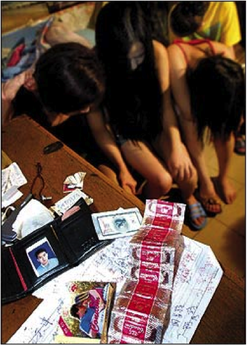 from http://acelebrationofwomen.org from http://acelebrationofwomen.org And this is where the trafficked children come in, bleeding from between their legs, bruised around the eyes, ropes dangling from their wrists, the sexually exploited young of our species, treated as merchandise by humans who don't recognize them as their own, who don't recognize their dearest kin. It's true that the consumers of stolen children and the pornography produced by raping them on camera are overwhelmingly white, and that the children are overwhelmingly brown, that racism helps the men who traffick to see soulless cargo. It's true that female people have millenia of dehumanization behind us, that we have been trafficked along every trade route of every inhabited continent, that the deep tracks of male domination carved the channel through which these children pour in their millions. I don't say that the broken filaments of our wild and ancient kinships are the sole root of anything, but I keep imagining what might happen if we could repair them. 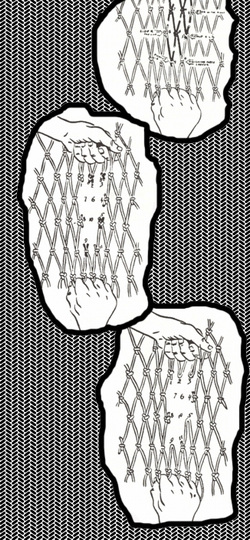 What if we could learn to retie knots between frayed ends, refasten the anchor lines, that bind us into the world, mend the torn nets through which we fall? I do not believe war is bred into us. Nature is as rich in examples of cooperation and symbiosis as it is of predation and combat. I believe we are forced against our own natures, wounded to the core by our separation from what gives us life, infected with fear that is consciously cultivated. As New York Police Commissioner Ray Kelly was revealed this week to have said, the "stop-and-frisk" policy targeted young African heritage and Latino men because he wanted to "instill fear in them that every time they left their homes they could be targeted by police." Fear is instilled in a thousand ways every day, to activate the parts of our ancient nervous systems dedicated to saving our lives from attack, and put our communal hearts on hold. This is why I write. To tell again and again, the story of the flowering, breathing world, to pierce the amnesia of loss and remind us that we are of the same fiber, not separate at all, that it is the severing of thread that leaves us vulnerable, that kinship is the antidote to fear, that solidarity is the road away from famine. That in a time of impending disaster, the thing to do is bind ourselves back into the suffering web of life and listen: to the uncountable leaves, the blowing rain, the scuffling, small things in the undergrowth, the rocks, the lizards, the cloud hung peaks, the swollen rivers and dusty scrub brush and ice laden birch trees, to listen until we can hear the planetary voice that is always singing, the billions of strands between us, the oceanic possibilities that move through the open valves of our communal hearts. Then, perhaps, driven by love, we could bind our collective wounds, and learn, like the nightingales, to sing along.
0 Comments
Your comment will be posted after it is approved.
Leave a Reply. |
About Aurora
Aurora Levins Morales is a disabled and chronically ill, community supported writer, historian, artist and activist. It takes a village to keep her blogs coming. To become part of the village it takes, donate here. Never miss a post!
Click below to add this blog to your favorite RSS reader: Archives
September 2017
Categories
All
|
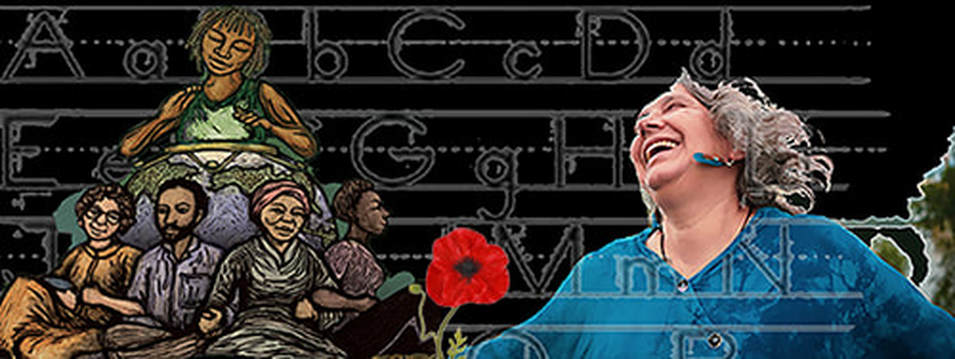
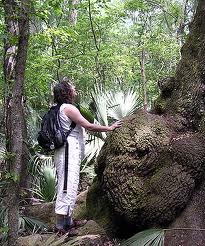
 RSS Feed
RSS Feed
